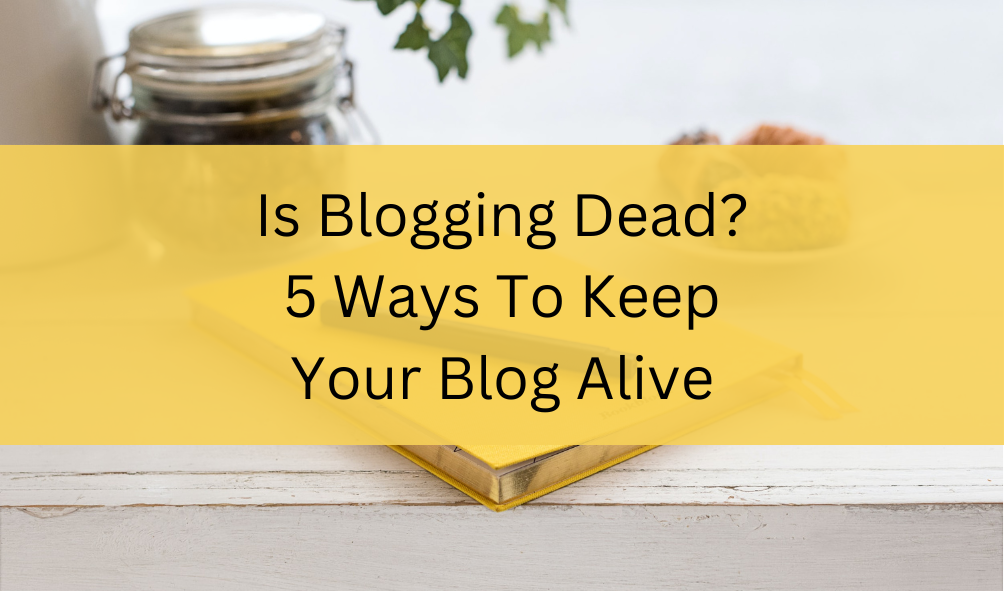Is Blogging Dead? 5 Ways To Keep Your Blog Alive
Do you want to know the answer to the question that buzzes around the internet? Is blogging dead?
Over the past few years, there have been many changes in the blogging world. From commenting systems to page designs and functionality, we’ve seen many trends come and go.
But despite all of these changes, one thing remains constant: people love writing in their blogs. And most of them aren’t doing it as a hobby either; they’re doing it for business purposes!
If you’re wondering whether blogging is still relevant today, keep reading as we go over the current state of blogging, what it used to be, how we will see it in the future, and the best ways to keep your blog alive for the long run.
Is Blogging Dead?
The short answer is no; blogging is not dead. It is alive and well and more popular than ever. In fact, there are over 600 million blogs in the world today, out of every 1.9 billion websites (source).
Moreover, HubSpot conducted a study in 2020, which shared the result that “that 60% of people read a blog at least once a week.” Thus, blogs aren’t going anywhere anytime soon.
So why do some people insist that blogging is dead? There are several reasons for this misconception:
Blogging has changed dramatically over the years. When the term “blog” was coined in 1999 by Jorn Barger, he was referring to a website with continuous updates of news or personal musings.
These days, blogs are often used as part of a content marketing strategy in which businesses share their expertise on topics related to their industry or niche interest group.
For example, if you owned an eCommerce store selling baby products, you might have a blog about parenting tips and tricks; or if you owned a car dealership, you might have a blog about new car models coming out next year.
In addition to these blogs, many people use their blogs as platforms for free promotion in exchange for affiliate sales or product reviews.
Sign Up And Get A Free Keyword Research Course In Your Mail Box To Increase Your Google Rankings!
Tips On How To Keep Your Blog Alive
The fact that there are so many blogs in the world means that there is also a lot of competition for readership. To stand out from the crowd, you need to create content that interests your audience and gives them something they can’t find anywhere else on the web.
Here are some tips you can follow up on to keep your blog alive and running:
Quality vs. Quantity:
You may be familiar with the phrase “quality over quantity.” It’s a common saying that is often used in business and marketing, but it is just as relevant for the content you write for your blog.
When it comes to writing articles for your blog, I recommend that you focus on quality over quantity. It is because each article can significantly affect how many people read your blog and subscribe.
If you write one article monthly and get 500 views on it, that’s great! But if you write five articles every week and only get 50 views on each one, then what was the point? This means that each article needs to be as high quality as possible to ensure that it will resonate with readers and help them achieve their goals.
With this in mind, here are some tips:
Write about something you know about: One of the biggest mistakes people make when starting their blog or website is to try to write about something they don’t know much about. If you want to stand out from other bloggers who are writing about similar topics, then it makes sense to focus on topics that are easy for you to write.
Make your sentences shorter: If you have really long sentences (especially ones with lots of commas), try breaking them down into smaller chunks so that each sentence is easier to comprehend.
Simple and Easy to Follow:
Writing for the web is different than writing for print. When writing an article, you have to make sure that your writing is simple and easy to follow.
The more complicated your prose is, the harder it will be for readers to understand what you’re saying. And if they can’t understand it, they won’t read it.
The easiest way to do this is by keeping your sentences simple and short. And since most people read your text on a mobile device, it’s more important that your sentences are short.
The second tip is to lead with content that interests your readers. This can range from sharing personal stories or experiences, reviewing products or services, and providing tips on how to solve problems.
You should also make sure your articles are written in a logical order and include plenty of headings and subheadings to break up the text. This makes it easier for people to find what they’re looking for and helps them navigate around the page more quickly.
Original Content:
There are many reasons why you should write original content. The most obvious one is that it’s the only way to ensure that your website is not penalized by search engines for duplicate content.
The more subtle reason is that writing unique content is a way of showing respect for your readers. By giving them something they haven’t seen before, you’re showing that you care enough about them to put in the effort to make their experience on your site better than anywhere else they could go online.
You can also use this opportunity to demonstrate your expertise and knowledge on a particular topic by writing something so compelling and insightful that people will want to share it with their friends and followers.
This will help build credibility for your website as well as increase traffic from social media sites like Twitter and Facebook.
By creating original content for every page on your site, you’ll also be able to get more traffic from search engines because each page will be optimized for specific keywords.
Link Back To Relevant Content:
When you write a blog post, think about other posts on your site that relate to the topic. If you’re writing about how to eat healthier, have you written other posts on this topic? If so, link to them in your blog post.
How does this work?
Well, it’s simple. When someone reads one of your blog posts and then clicks on another related post, they’ll be taken to that page. If they like it, they’ll read more of your content and become more engaged with your site.
This not only increases the chances that they’ll buy something from you, but it also increases their chances of sharing your content with others via social media or email.
Furthermore, it shows that you are knowledgeable in the subject area and provides additional information for readers who want more details on a particular topic. It will also help search engines crawl your content more effectively.
Add A Newsletter Form:
When it comes to blogging, most people think about writing articles and posting them on their websites. This is the part that gets all the attention, but there’s another important part of blogging that’s often overlooked by new bloggers is building an email list.
A newsletter is a great way to keep your blog alive. It helps build connections with readers and share your content. It can be a simple way to stay in touch with subscribers and let them know what you’re up to.
Depending on your schedule, you can send an email once a week or once a month; you can use newsletters to run contests, announce new products or services, share tips and tricks, ask for feedback, and more.
But remember not to bombard your subscribers with too many emails.
Conclusion
So, is blogging dead? It doesn’t look that way. I’m sure you could come up with plenty of reasons why blogging is supposedly “dead,” but the reality is that blogging isn’t going anywhere.
Because as our world continues to evolve and as technology becomes even further, blogging will keep changing and morphing into new, modern forms. The fundamentals of blogging, the need for an audience, and the drive for popularity will always be around.
Blogs are the people’s media, which is why they are still popular in their purest forms.
Frequently Asked Questions
Do People Still Read Blogs Anymore?
Despite the rise of social media and other forms of content, many people still read blogs. In fact, 77% of interest users read blogs almost every other day (source).
Is Personal Blogging Dead?
Personal blogging is not dead. It’s just shifting into a new phase. As people get more comfortable with social media and mobile technology, they expect their content to be more interactive, visual, and shareable. As a result, blogs will become less personal while maintaining the personal touch that keeps the audience engaged.
What Has Replaced Blogging?
Blogging is not dead, but it has changed. Blogging is no longer just a way to share stories with friends and family. It has become a powerful marketing tool to help you grow your business and build an audience.
Is Lifestyle Blogging Dead?
Lifestyle blogging is a huge trend that’s been around for years, and it doesn’t seem to be going away anytime soon. In fact, there are plenty of successful lifestyle blogs such as The Anna Edit, A Beautiful Mess, etc.
Is Blogging Still Profitable?
Blogging has become a trendy way of making money online. Most bloggers start out as hobbyists but soon discover they can make money from their blogs. Bloggers can earn a living by writing about any topic that interests them. Still, many have turned their blogs into businesses by building an audience and selling products on their websites or through affiliate marketing.
Is Blogging Worth It?
The answer to the question “is blogging worth it” is always going to be subjective. It depends on your goals, how much time you are willing to invest, and the type of blog you plan to run.
Does Blogging Have A Future?
Blogging has a future, but it will have to adapt to new technologies and trends.
Sign Up And Get A Free Keyword Research Course In Your Mail Box To Increase Your Google Rankings!
- 180+ Cake Business Names - July 23, 2024
- How To Start An ATM Business - July 20, 2024
- 120+ Crochet Business Names - July 17, 2024

